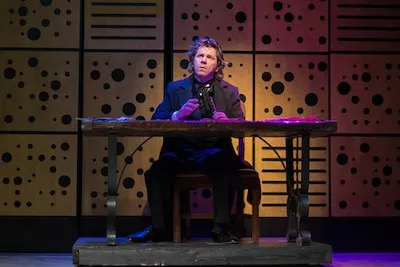As a mode of composition, we tend to think of theme and variations as best suited to music and the literary arts that spring from it, lyric poetry and song. Drama? We tend to forget that Greek tragedy was firmly rooted in poetry and that lyric drama sailed on serenely for centuries after Moliere's couplets and Shakespeare's blank verse before capsizing in the middle of the 20th Century. Yet as Moisés Kaufman's 33 Variations demonstrates, the concept of theme and variations can have considerable emotional appeal, particularly when a Carolina Actors Studio Theatre production, orchestrated by director Charles LaBorde, consistently hits the right notes.

At the heart of Kaufman's drama, we find Ludwig van Beethoven, already going deaf when we first see him in his declining years - famously driven and difficult despite his poverty. But we don't encounter the great German composer until we become well-acquainted with American musicologist Katherine Brandt, her daughter Clara, and a young male nurse, Mike Clark, who falls for the wayward daughter while treating the resolute mother.
So it's Katherine who really introduces the main themes - a consuming obsession, failing health, and difficulty connecting with those close to her. Suffering terminally from ALS (Lou Gehrig's Disease), she elects to travel to Beethoven's homeland and pore over the master's personal papers in an attempt to solve the riddle of why, with so many bigger fish to fry, like the Ninth Symphony and the Missa Solemnis, Beethoven devoted so much time to creating 33 variations on a theme composed by Antonio Diabelli when the mediocre publisher/tunesmith had only asked for one.
Mike gives Katherine the green light to make the trip, but Clara remains staunchly opposed. It's complicated with Clara. She's plausibly afraid that the trip might shorten what little time her mother has left, she doesn't really get the importance of her Beethoven quest, and there are mother-daughter issues she'd like to resolve before time runs out.
We begin to see the parallels between Katherine and the declining Beethoven when the musicologist arrives in 21st Century Bonn and begins her researches into what possessed Beethoven back in 1819-23. Here we find that Beethoven's finances are even more compromised than his health at the time when Diabelli endeavors to get the Austrian Empire's 50 top composers to each write a variation on his waltz, promising to publish them all together in a prestigious compendium.
After deriding the piece as a "Schusterfleck" or cobbler's patch, Beethoven sends his secretary, Anton Schindler, back to Diabelli to reject the project. The tempestuous composer subsequently calms down, sees that he can indeed work with the humble waltz, eventually becoming obsessed with his task, attempting to eclipse Bach's famous 32-variation Goldberg Variations with a keyboard masterwork of his own. But not before he sends Schindler back to Diabelli to wheedle a sizable commission - and advance - from the publisher.
Unlike the mediocrity who bedevils Mozart in Amadeus, Diabelli and Schindler are benign mediocrities. Destined to become his biographer, Schindler is as much Beethoven's publicist as he is his servant. How Clara becomes a variant of Schindler is a delight that I'll let you discover late in Act 2 of Kaufman's script. Suffice it to say that the parallels between Ludwig's final days and Katherine's nearly two centuries later become more vivid, palpable, and meaningful.
The big question, of course, is how impactful these two parallel lives can be when they don't physically connect across those centuries. It will depend. If you've devoted your life to research or scientific investigation, Katherine's thrill at holding Beethoven's papers - seeing the spatters of his soup on the pages - will surely resonate deeply. Other than that, LaBorde and his cast do remarkably well in bridging the wide gap, aided by an efficient, pitch-perfect set by James Edward Burns, live piano work from Marty Gregory on the pertinent passages, and elegant projection designs by Donald Devet.
The efficiency of Burns's set is a godsend for a production that runs 134 minutes, particularly in the slick scene changes. Another godsend is Cynthia Farbman Harris as Katherine, the tunnel-visioned professional who may be realizing too late that her directionless daughter could have used some of the attention that mom lavished on her career. There's enough cold steeliness in Harris's passionate devotion to her quest to remind us that Katherine is a flawed vessel with serious blind spots. Overcoming these is certainly a challenge when juxtaposed with Martina Logan's self-centered portrayal of Clara, a footloose young woman who freezes into resentment because she hasn't developed the sense to envy her mother's purposefulness.
Back in the 19th Century, Christian Casper isn't the most formidable Beethoven we could have, but the orneriness, intensity, and madness - whether tinged with desperation or exaltation - are all vivid, bristling with Germanic fervor. Of course, Tom Scott played Salieri not so long ago in Amadeus (and Dr. Watson, for that matter), so he knows his way around a second fiddle. This one is servile, cunning, and a tad comical. Bob Paolino's burgher-like geniality as Diabelli nicely counterbalances Beethoven's arrogance and Schindler's shiftiness, a contrast sharpened by Jamey Varnadore's costume designs.
Other minor characters are delectable. Samuel Crawford has more than enough quiet charm as Nurse Clark to make us question Katherine's disdain for him - and Clara's resistance. Guardian of the tradition, Meg Wood fills librarian Ladenburger with Teutonic propriety from toe-to-crown, delivered with a ramrod posture and the slightest twinkling of empathy. These Brandts can certainly use it, almost as much as Beethoven himself.
